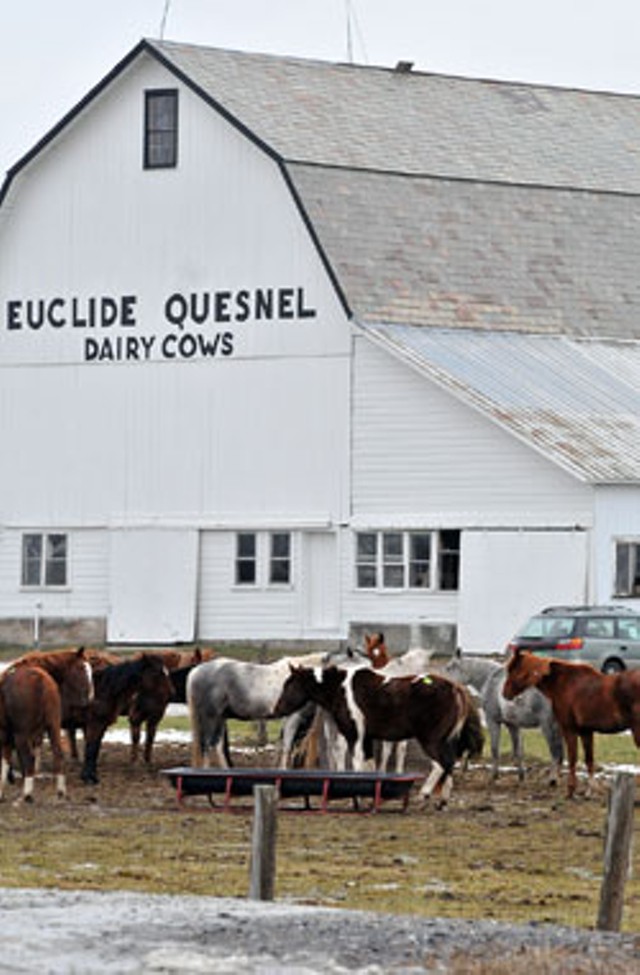Published March 24, 2010 at 9:46 a.m.
Barbara Kaiser of Cornwall was driving by a farm on Route 7 in Middlebury last December when she recognized her own horse, Tie Dye, standing out in the cold. Some months before, she had loaned the 22-year-old Appaloosa to a stable, which in turn had loaned it to someone inexperienced with horses. The animal had resurfaced at the farm owned by Bernard and Louis Quesnel, aka Quesnel Livestock. Tie Dye was tagged with a sticker that indicated she was headed for slaughter in Canada, where the practice is legal.
Kaiser returned later that day with a trailer and proof of ownership, and after an altercation with the Quesnels involving both the Middlebury and the Vermont State Police, she reclaimed the horse. Shortly afterward, the farm’s livestock trading license was temporarily suspended.
“It was sheer luck that I even found her,” said Kaiser in an interview in December. But she worried the same thing might have happened to the 11 other horses on the property.
Although the Quesnels were never charged with animal cruelty, Kaiser’s concern was justified. The economic downturn has increased the number of unwanted horses in Vermont and, by many accounts, exacerbated equine abuse in the state, whether it’s as a result of owners struggling to afford veterinary bills and feed, overburdened animal shelters with limited options for sick and aging horses, or farmers looking for extra cash.
That’s why a group of concerned humane society reps, veterinarians, farriers and horse owners gathered last week at Middlebury’s Ilsley Public Library. The standing-room-only meeting was the first in a statewide effort to establish a Vermont Equine Welfare Council.
Why do horses need special protection? In 2009, the Vermont Humane Federation, a network of humane societies in the state, received a total of 335 animal cruelty complaints. Of these, horse complaints were the second most common — 20 percent were horse related, compared with the 37 percent that concerned dogs. That doesn’t count the cases reported directly to law enforcement officers.
“We’re hoping to come up with some solutions [for] an unwanted horse epidemic that’s actually national,” said Joanne Bourbeau, senior state director for the Humane Society of the United States.
The problems derive in large part from the high cost of keeping a horse — when times are tough, it’s difficult to justify the food, vet and farrier expenses involved in keeping a large animal fed, shod and healthy.
“It’s $2000 per year to take care of a horse and to do it the correct way,” said Michelle Kingston of Lazy Acres Equines in Brandon, who owns six horses. And, she added, that’s not counting the unexpected medical bills for sickness and injury. Older animals often fall into the hands of owners who cannot — or do not want to — pay the high price of properly caring for a horse. Euthanizing the animal presents it’s own unique problems, including the cost of a house call and carcass disposal.
“Back when we started, we rarely got phone calls from people wanting to get rid of their horses,” said Gina Brown, owner and founder of Spring Hill Horse Rescue in Clarendon. “There’s probably been a 300 percent increase, maybe more.”
Brown and Bourbeau are the driving forces behind the Equine Welfare Council. They chose Addison County for the first meeting largely because of the Quesnel case.
When Kaiser’s complaint reached the Vermont Agency of Agriculture, Food and Markets, the state was already conducting an investigation into allegations the Quesnel brothers had sold horses within the state without proper testing for equine infectious anemia. By law, horses do not have to be tested for the disease if they are being transported out of the state, but sales within the state fall under the more rigorous standards of the state agency.
In response to the charges, the state temporarily suspended the Quesnels’ livestock trading license, and the brothers later agreed to desist from buying, selling, trading or transporting horses for two years, in addition to paying a $4000 fine and an additional $3260 if they fail to adhere to their agreement during the two-year period.
The Quesnel case “is a symptom of the problem, which is horse overpopulation,” said Brown.
Bourbeau added, “It spurred a lot of people in Addison County to want to talk about how we care for horses.”
It turns out Addison County isn’t the only area of the state with too many horses and insufficient resources to care for them. Tammy McNamara, a veterinarian from the Vermont-New Hampshire Veterinary Clinic in East Dummerston, came to the meeting in Middlebury because she sees these problems playing out every day.
Unwanted horses are “becoming more and more of a problem in the state,” said McNamara, who took it upon herself to adopt three horses from Gina Brown.
“I get emails in my inbox every single day from people who can’t afford to keep their horses,” said Kingston. “I’d say I get between 60 and 70 requests per week.”
The requests come both from Vermont and out of state, and Kingston simply doesn’t have the capacity to take on any more horses.
“It’s very frustrating,” she said.
Kingston teaches riding lessons with her horses, but she also requires that students understand the economics of equine ownership. That, she said, has likely made some of them think twice before purchasing a horse.
Brown and Bourbeau have similar, but larger, aspirations for the Vermont Equine Welfare Council, which they hope to model after an existing organization in Oregon. The Oregon Horse Welfare Council maintains a “hay bank” and a directory of resources for horse owners and horse rescue organizations. It also organizes a temporary-foster-home network and assistance programs for veterinary care and humane euthanasia.
Everyone who attended last Tuesday’s meeting supported those initiatives.
“Animal cruelty is a community problem,” said Bourbeau. “It requires a community solution.”
This is a version of an article that first appeared in the Addison County Independent.
Info:
For more information on the Vermont Equine Welfare Council, email Joanne Bourbeau or call Gina Brown at 775-1098.
More By This Author
Speaking of Local Matters, animals
-

Q&A: A Clinic Has Cared for Old North End Pets for Almost 20 Years
Jan 31, 2024 -

Video: The Old North End Veterinary Clinic Has Kept Costs Low to Help Pets in Burlington for Almost 20 Years
Jan 25, 2024 -

Q&A: Merrymac Farm Sanctuary in Charlotte Provides a Forever Home for Neglected Animals
Dec 6, 2023 -

Video: Neglected Animals Find a Home With Era MacDonald at Merrymac Farm Sanctuary in Charlotte
Nov 30, 2023 -

Response Teams Provide Shelter for Pets of Evacuated Vermonters
Jul 16, 2023 - More »
Comments
Comments are closed.
From 2014-2020, Seven Days allowed readers to comment on all stories posted on our website. While we've appreciated the suggestions and insights, right now Seven Days is prioritizing our core mission — producing high-quality, responsible local journalism — over moderating online debates between readers.
To criticize, correct or praise our reporting, please send us a letter to the editor or send us a tip. We’ll check it out and report the results.
Online comments may return when we have better tech tools for managing them. Thanks for reading.















































